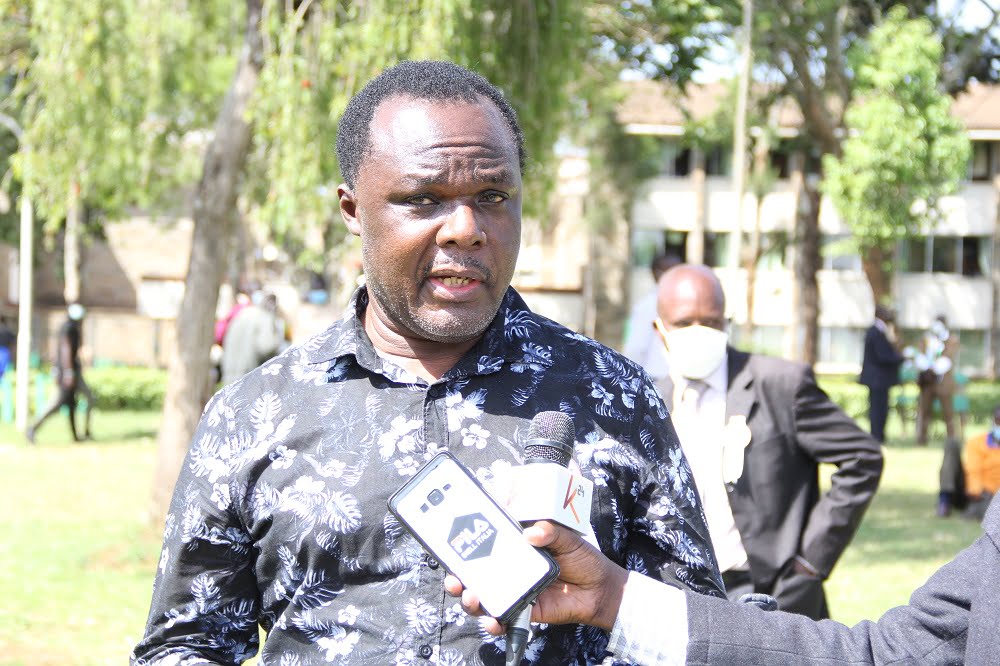By Roy Hezron
The Kenya National Qualifications Authority (KNQA) now wants institutions of higher learning in the country to review their curriculum after every four years in order to produce graduates with skills that match the market demand.
The Authority’s Director General and Chief Executive Officer (CEO) Dr. Juma Mukhwana noted that the Authority’s work is to keep colleges and universities on toes to ensure that their qualifications are relevant and to the current market matching the market needs since the market is dynamic and changes every day.
“The area of developing new programmes and new qualifications is a dynamic area. We have to look at the market. The market is changing. We have climate change, Covid-19, we have new challenges, digital skills…so it’s not a one day solution, is a process, a culture that we have to develop as a country to ensure that we transform and reform our Curriculum and qualifications everyday so that they keep pace with the market,” said Dr. Mukhwana.
Dr. Mukhwana who was addressing the press at Sankara Hotel in Nairobi on April 4, 2022 during a ceremony to award a certificate of accreditation to the International Certificate of Digital Literacy (ICDL) raised concern on the increasing trend of skill mismatch in the employment industry.
“One of the challenges we have as a country is that we are having people without jobs and jobs without people in the same ecosystem. So we have jobs which we cannot find skills but we also have a lot of people that are looking for jobs; so we have created a situation where you have jobs without people and people without jobs in the same environment,” he said.
Dr. Mukhwana lauded the University of Nairobi (UoN) for its recent reforms that saw several courses being scrapped.
Last year, UoN moved to scale down the number of courses offered from over 500 courses to about 300 courses with University Vice-Chancellor Prof Stephen Kiama announcing in February this year that they are planning to drop more courses and merge others.
“What the market is looking for today is not what it will be looking for tomorrow. The kind of person you are looking for as ICT (Information and Communication Technology) expert is very different from the one you will be looking for in three (3) years,” added Dr. Mukhwana.
According to Dr. Mukhwana the Authority’s Qualification Framework, the Kenya National Qualification Framework (KNQF), is a reformed tool that the Authority uses to continuously reform one’s education and training; which goes to an extend of recognizing prior learning areas.
In 2021 the Authority (KNQA) came up with a policy that will see those Kenyans who possesses knowledge, understanding, skills and competencies in various fields like plumbing, electrical, masonry, mechanic among others being recognized and awarded certificates which will see them secure employment just like those with formal education.
The policy titled Recognition of Prior Learning (RPL) Policy Framework in Kenya focuses on the outcomes rather than how, when or where the learning occurred; will see those who’re not in position of reading English or Kiswahili progress through the pathway after recognition and attaining even Bachelor’s, Master’s and Doctoral (Ph.D.) degrees in various fields.
“There are people that are getting skills without going to school. A lot of us have a lot of qualifications and skills. If you look at this country 70 per cent or even 80 per cent of people who do works like plumbing, masonry, electrical, mechanic; they have never gone to any formal college but they have skills and as a country we have ignored. We only look at qualifications coming through a formal sector,” stated Dr. Mukhwana.
He noted that what the Qualification Framework is now allowing is to recognize those qualifications that people have received without going to any school because those qualifications are important since they build the economy.
The RPL is also aligned with the African Continental Qualifications Framework, a concept developed by the African Union with the support of the European Union hence allowing for free mobility meaning that upon recognition and getting the certificate, one can work in any part of the country both in East African countries and within Africa.
The KNQA was set up in 2015 under the Kenya National Qualifications Framework (KNQF) act no. 22 of 2014 (and KNQF Regulations, 2018) to help coordinate and harmonize the various levels of education; and to create a database of all qualifications in the country.
Some of the main functions of the Authority is to co-ordinate and supervise the development of policies on National Qualifications, develop a framework for the development of an accreditation system on qualifications, develop a system for assessment of national qualifications, develop and review inter-relationships and linkages across national qualifications in consultation with stakeholders, relevant institutions and agencies and maintain a national database of national qualifications among others.






